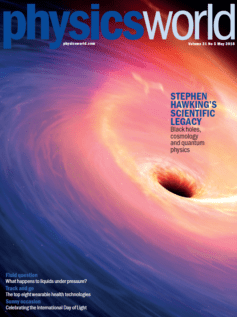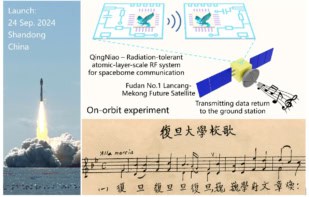
Stephen Hawking, who died on 14 March at the age of 76, was the physicist the whole world knew. But what exactly were his key scientific achievements? Out now in print and digital format, the May 2018 issue of Physics World examines Hawking’s scientific legacy through the eyes of Seth Lloyd from the Massachusetts institute of Technology, who knew the great man and includes some of his favourite Hawking anecdotes too. It’s an unmissable article that you can also read online here.
Elsewhere, you can discover the eight most promising wearable technologies for monitoring your health and find out why research into the mysteries of liquids could help us know what’s going on at high pressures inside planets like Jupiter.
Plus learn about the upcoming International Day of Light on 16 May, explore working in the Paralympics “pit lane” in this month’s Lateral Thoughts article, and find out what life’s like as a PhD physicist with a career at NASA’s Jet Propulsion Laboratory in California.
Plant physics: the April 2018 issue of Physics World is now out
Remember that if you’re a member of the Institute of Physics, you can read the whole of Physics World magazine from the start of every month via our digital apps for iOS, Android and Web browsers. Let us know what you think about the issue on Twitter, Facebook or by e-mailing us at pwld@iop.org .
For the record, here’s a run-down of what else is in the issue.
• A day of light – James McKenzie reflects on the business impact of lasers and light-emitting diodes
• A cancer collaboration – David Scott outlines why we need physics to drive change in cancer research
• Unenlightened thinking – Steven Pinker may be a talented scientist, but he abuses the humanities, argues Robert P Crease
• Hawking’s gift – The late Stephen Hawking is an icon of modern physics. As well as inspiring generations of scientists, his contributions have changed our understanding of the universe. Seth Lloyd looks back over Hawking’s key scientific achievements, from gravitational singularities to quantum cosmology
• Making health digital – With wearable tech now a staple of modern life, it’s never been easier to keep track of your health. But what will be the next big innovation? Jess Wade gives her top eight technologies-in-the-making that will lead to a new generation of health aids
• Liquid mysteries – It’s easy to assume there’s nothing new to learn about liquids. John Proctor explains just how weird liquids can be at high pressures and why this work could shed light on planetary interiors
• Take a teacher and a pupil – Philip Ball reviews The Dialogues: Conversations About the Nature of the Universe by Clifford V Johnson
• From dust to dust – Tushna Commissariat reviews Losing the Nobel Prize: a Story of Cosmology, Ambition, and the Perils of Science’s Highest Honour by Brian Keating
• Engineering a career in terahertz – A PhD in physics is the perfect basis for a career as an engineer, as Ken Cooper from NASA’s Jet Propulsion Laboratory tells Susan Curtis
• Once a physicist – meet LeeAnn Janissen, who divides her time between her ceramic-art practice and her role as managing director of research for East Coast Fund Management in Toronto, Canada
• Life in the Paralympics ‘pit lane’ – Maddy Nichols, who is a PhD student at the Bristol Centre for Functional Nanomaterials in the UK, describes her role at the 2018 Pyeongchang Winter Paralympic Games in South Korea.
And don’t forget, if you have any thoughts on the issue do let us know on Twitter, Facebook or by e-mailing us at physics.world@iop.org.




